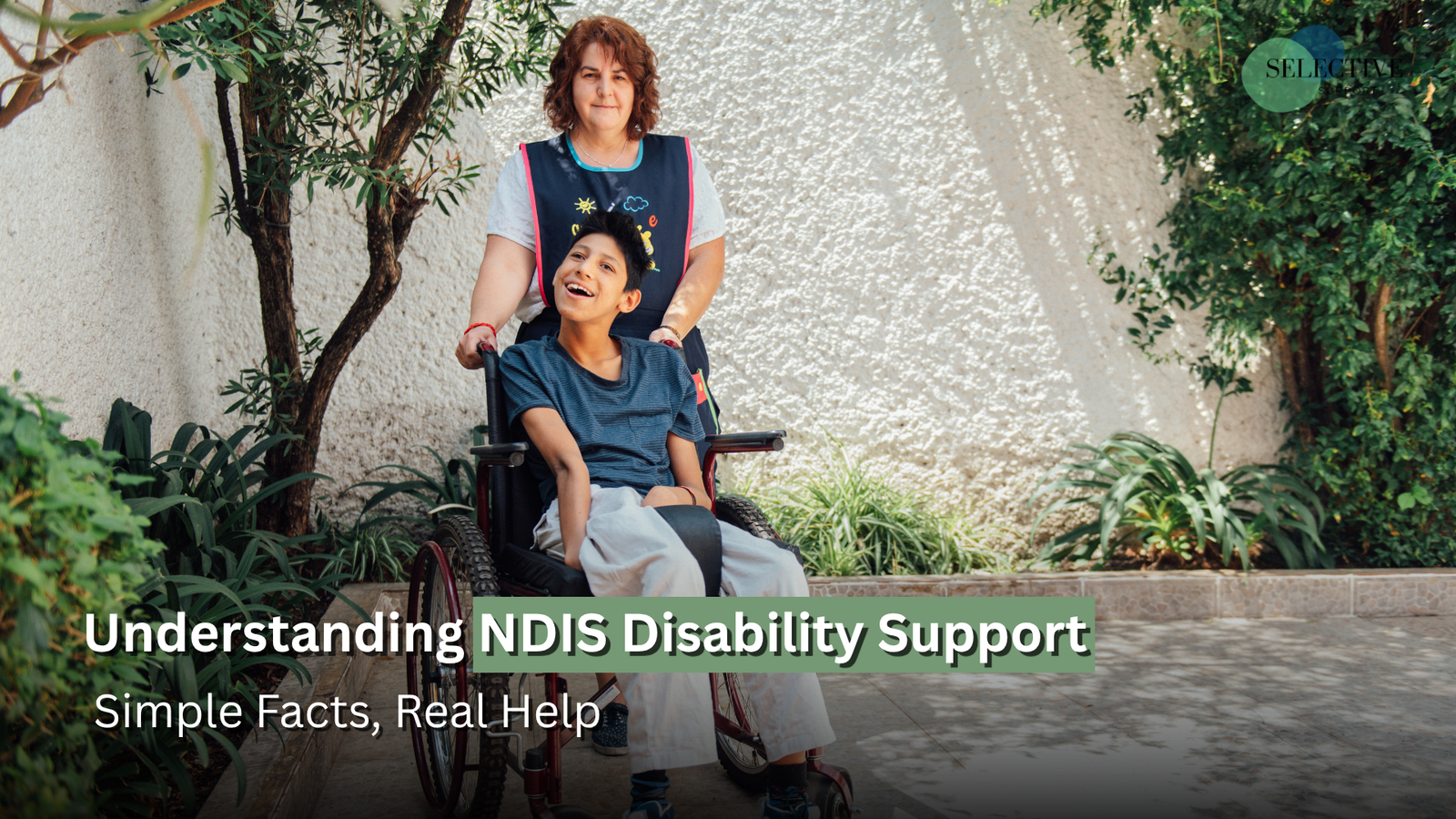What Disabilities Does NDIS Cover? 5 Facts to Help You Plan
Ever wondered what disabilities does NDIS cover—and if yours or your loved one’s qualifies? With over 610,000 Australians now receiving support through the NDIS, understanding who is eligible is more important than ever. But for many, figuring it out can feel confusing or overwhelming. The good news? You don’t need to decode it alone. In this article, you’ll find 5 clear facts that break down the essentials—so you can feel more confident, informed, and ready to plan the next steps.
1. NDIS Disability Coverage Focuses on Permanent and Significant Conditions
When it comes to NDIS eligibility, one of the most important things to understand is that the scheme supports people with permanent and significant disabilities, those that affect your ability to do everyday things on your own. But this doesn’t mean you need a long list of diagnoses. What matters most is how your condition impacts your life.
According to the NDIA, a disability is considered permanent if it’s likely to be lifelong, and significant if it substantially reduces your ability to participate in daily activities like working, learning, or looking after yourself.
Here are some examples of disabilities that may be covered under NDIS:
- Psychosocial disabilities such as schizophrenia, severe anxiety, or bipolar disorder
- Autism and developmental delays, including autism spectrum disorder and global developmental delay
- Intellectual disabilities that affect reasoning, learning, and decision-making
- Physical disabilities like cerebral palsy, multiple sclerosis (MS), or spinal cord injuries
- Neurological conditions such as acquired brain injury or stroke-related impairments
If your disability affects how you communicate, move, learn, or take care of yourself, there’s a good chance you could be eligible for NDIS disability support.
It’s also important to know that each case is looked at individually. The focus is on function, not just a diagnosis. That’s why someone with the same condition as you might receive different supports, it all depends on their needs.
You don’t need to have all the answers right now. The key is understanding how your daily life is affected, and getting support that’s tailored to you.
2. You May Qualify for NDIS Disability Services Without a Medical Diagnosis
Many people assume you need a formal diagnosis before you can access NDIS disability services, but that’s not always the case. What really matters is how your condition affects your ability to function day to day.
The NDIS looks at the impact, not just the label. If a condition—diagnosed or not—is permanent and significantly affects things like communication, mobility, self-care, or social interaction, you may still be eligible.
For example:
- Someone with undiagnosed mental health challenges who struggles with leaving the house, maintaining relationships, or holding down a routine could qualify under psychosocial disability.
- A child showing clear signs of developmental delay but still awaiting a formal diagnosis might still access early intervention support.
So, if you or a loved one is facing daily challenges but hasn’t received a clear diagnosis yet, don’t let that stop you from reaching out.
Wondering if you or your loved one qualifies? Selective Support NDIS disability services team can walk you through it, no pressure, no judgment. Understanding the NDIS doesn’t have to be overwhelming. With the right support, you can get the clarity and help you deserve.

3. Common Conditions Supported by the NDIS Disability System
The NDIS supports a wide range of conditions, but what’s important is not just the diagnosis, but how the condition affects your everyday life. Whether you’re dealing with a physical disability, developmental delay, or mental health condition, the NDIS disability system is designed to support people with permanent and significant challenges in their daily activities.
Here are three main categories of conditions commonly supported by the NDIS:
1. Physical and Neurological Disabilities
These conditions often affect movement, mobility, or brain function. They may be present from birth or acquired later in life.
- Cerebral palsy
- Multiple sclerosis (MS)
- Spinal cord injury
- Acquired brain injury (ABI)
- Muscular dystrophy
People with these conditions may need help with physical supports, equipment, home modifications, or therapy services.
2. Intellectual and Developmental Disabilities
This group includes conditions that impact learning, communication, and daily living skills. NDIS support can make a big difference in building independence and confidence.
- Autism spectrum disorder (ASD)
- Down syndrome
- Global developmental delay
- Intellectual disability
Support may include life skills training, behaviour support, and early intervention therapies.
3. Psychosocial and Mental Health Conditions
Psychosocial disability is a term used to describe the impact of mental health challenges on functioning. If your condition is ongoing and significantly affects your daily life, the NDIS may help.
- Schizophrenia
- Bipolar disorder
- Severe anxiety or depression
- PTSD or complex trauma
If you’re living with mental health challenges, you’re not alone—and yes, NDIS disability support is available.
Everyone’s journey is unique. The NDIS looks at your needs, not just your diagnosis. If you’re still unsure, the team at Selective Support is here to help you find clarity and confidence in your next step.
4. The Right NDIS Disability Provider Makes a Big Difference
When it comes to navigating the NDIS, the provider you choose can shape your entire experience. A great NDIS disability provider does more than just connect you to services, they listen, explain things clearly, and walk beside you every step of the way.
Here’s what to look for in a provider:
- Experience with the NDIS: They should know the ins and outs of the system and help you make the most of your funding.
- Clear communication: A good provider breaks things down simply, without jargon or judgement.
- Compassion and respect: You deserve to feel heard and supported, not like a number on a caseload.
“Dotty, my support coordinator has been a wonderful support for me. Without Dotty’s guidance and assistance my life was spiralling and I’m ever so grateful. Dotty was an earth angel for me”
-Lisa, NDIS Participant

At Selective Support, we take pride in offering personal, responsive care that puts you at the centre. Whether you’re just starting your NDIS journey or want to feel more in control of your plan, our team is here to make things easier, not more confusing.
You don’t have to figure it all out alone. With the right support, the NDIS can open doors to greater confidence, independence, and peace of mind.
5. You’re Not Alone – Help is Available to Navigate Disability NDIS Support
Feeling overwhelmed by the NDIS system? You’re not the only one, and you don’t have to go it alone. Whether you’re new to the scheme or trying to make sense of your plan, the right support can take a huge weight off your shoulders.
Two key services can make a real difference:
- Support Coordination: Helps you understand your NDIS plan, make informed choices, and connect with the right services.
- Psychosocial Recovery Coaching: Offers ongoing guidance for people living with mental health challenges, helping you build confidence, routines, and independence over time.
At Selective Support, we specialise in simplifying the NDIS. We take the time to listen, explain things in plain language, and advocate for what matters to you. You’ll never be treated like a number,we’re here to empower you to take control of your journey.
No question is too small. No challenge is too complex. We’ll meet you where you’re at and walk beside you every step of the way.
Conclusion: You Deserve Clarity and Support
Understanding what disabilities the NDIS covers is the first step to getting the support you or your loved one needs. Whether you’re navigating a new diagnosis, managing ongoing challenges, or just unsure where to start, remember—you don’t have to figure it out alone. We’ve covered how the NDIS looks at functional impact, the types of conditions commonly supported, and the importance of choosing the right provider. Now it’s your turn to take the next step. Let’s make your NDIS plan work for you, contact Selective Support today.
FAQs: Understanding NDIS Coverage – What You Need to Know
1. What illnesses are covered by the NDIS?
The NDIS doesn’t focus on illnesses or diagnoses alone—it supports people with permanent and significant disabilities that affect daily life. This includes conditions that may arise from illnesses, such as multiple sclerosis, stroke, acquired brain injury, or severe mental health conditions like schizophrenia. If an illness leads to long-term functional challenges (e.g. with mobility, communication, or self-care), it may be covered under the NDIS.
2. What is the most common disability in the NDIS?
Autism spectrum disorder is currently the most commonly supported disability under the NDIS. Other frequently supported conditions include intellectual disabilities, psychosocial disabilities (mental health), and physical impairments like cerebral palsy or spinal cord injury.
3. Are learning disabilities covered by the NDIS?
Yes—learning disabilities can be covered if they are permanent and significantly impact a person’s ability to take part in everyday activities. For example, people with global developmental delay, dyslexia (in severe cases), or intellectual disabilities may be eligible for support. The key is how the condition affects the person’s functioning, not just the label itself.


